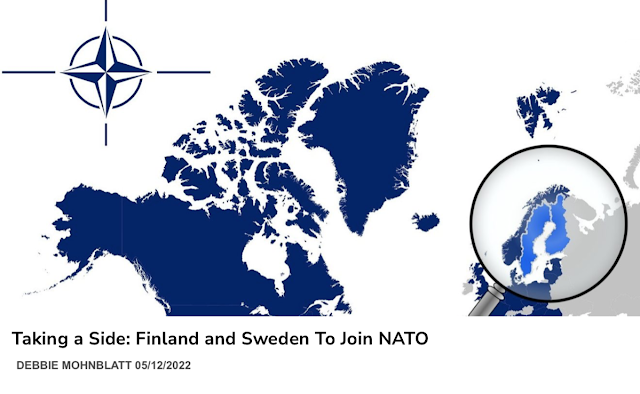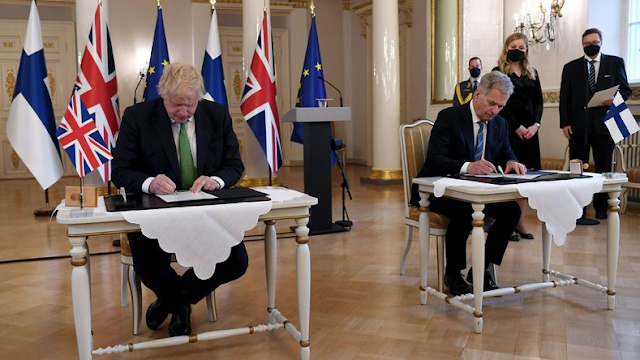Helsinki Think Tank takes part in the Vilnius Summit 11-12 July 2023
Helsinki Think Tank in the news
"Not poking the bear" no longer
enough to guard safety, experts say
Finland’s President Sauli Niinistö and Prime Minister Sanna Marin
called in a joint statement on Thursday for their country to apply
to join NATO “without delay.” Finland is set to make an official
decision on Sunday after the motion is approved by parliament.
Neighboring Sweden is expected to announce a similar decision
on Sunday as well.
The move comes after Finland, and Sweden on Wednesday signed
parallel security pacts with the UK during a visit by British Prime
Minister Boris Johnson.
Michael Hulden, chairman of the Helsinki Think Tank, told
The Media Line the move toward NATO is strategically significant.
“Russia has said that it will retaliate with more than words, and
the most delicate time would be from the moment that Finland
applies [for membership in the Western alliance], to the moment
when it is approved,” he said.
By signing the mutual protection agreement with the UK, Finland
has acquired “the safety needed to cover the time needed for
becoming a full NATO member,” Hulden said.
Alice Gower, director of geopolitics and security at London-based
strategic advisory firm Azure Strategy, said in an interview with
The Media Line that the aggressive and unprovoked nature of
President Vladimir Putin’s actions against Ukraine has brought
into stark relief the threat that Russia poses to these Nordic states.
“Where fear of irking Russia has previously prevented the states
from choosing an alliance one way or the other, Russia’s unilateral
invasion of Ukraine has shifted the thinking publicly and within
government,” she added. It is no longer enough to be passive,
Gower continued. “States must take the initiative and preemptively
protect themselves to prevent a similar attack against their interests.”
Maria Mekri, the executive director at SaferGlobe, Finland’s
leading independent peace and security think tank, told The Media
Line the invasion of Ukraine is just one action in a long series that
has shown Europe the nature of Russia’s intentions.
The expected NATO applications were not prompted by the Ukraine
invasion per se, she said, “but rather by the change in the security
environment in Europe and the awareness of Russia’s irrational
and detrimental actions.”
Gower noted that Putin’s actions in Ukraine have forced these
countries to reconsider their national security posture and reassess
the Russian threat.
Finland shares a 1,340-km. (830-mile) border with Russia, one
that is difficult to patrol and defend from any attack from the east,
she added. Joining NATO would assure military protection from
the organization’s members, “a fact that Finland and Sweden
hope would act as a sufficient deterrent to Moscow,” she said.
As soon as the two countries become NATO members, Article 5
of the North Atlantic Treaty would cover them.
Article 5 commits each member state to consider an armed attack
against one member state, in Europe or North America, to be an
armed attack against them all. Upon such an attack, each member
state is to assist by taking “such action as [the member state]
deems necessary, including the use of armed force, to restore and
maintain the security of the North Atlantic area.”
Hulden said that if Sweden and Finland join the alliance,
the Nordic countries will be “a big NATO corridor neighboring
Russia even by sea.”
Helsinki 11.5.2022
Finlands President Niinistö and Britains Prime minister
today signed a treaty on bilateral security.
United Kingdom – Finland statement
The Republic of Finland and the United Kingdom of Great Britain & Northern Ireland
reiterate our shared desire for ever deeper defence and security cooperation that
is fit for any circumstances.
We are committed to defending the principles of the European security order.
In light of the deterioration of the security situation in Europe, we wish to further
intensify our security and defence cooperation and strengthen our mutual solidarity.
We will build on our current, established cooperation and work together to further
develop our capabilities.
We condemn the ongoing Russian invasion in Ukraine and call on the Russian
Federation to immediately cease hostilities, withdraw its troops from Ukraine and
seriously engage in peace negotiations.
We have been increasing support for Ukraine, including deliveries of lethal material,
and are committed to helping the Ukrainians in rebuilding their country when
Russia´s military offensive ends.
Finland welcomes the United Kingdom´s strong commitment to the security of the
Baltic Sea region, including British troops in Estonia as a part of NATO´s presence
and the United Kingdom led Joint Expeditionary Force, of which Finland is a
committed member.
The United Kingdom is unwavering in its commitment to NATO´s ‘open door’ policy.
The United Kingdom welcomes Finland’s role in providing security in the Baltic Sea
region, in Northern Europe and beyond. The United Kingdom firmly believes that,
should Finland decide to apply for NATO membership, it would contribute to the
security of the whole North Atlantic area. Finland and the United Kingdom share
common security interests and the United Kingdom stands ready to assist Finland
in its endeavours by all means necessary.
We confirmed that, should either country suffer a disaster or an attack, the
United Kingdom and Finland will, upon request from the affected country, a
ssist each other in a variety of ways, which may include military means.
This cooperation will remain fully in line with each country’s security and
defence policy and is designed to complement not replace existing European
and Euro-Atlantic cooperation.
The United Kingdom and Finland will intensify and deepen their cooperation,
including in countering hybrid threats and influence activities. Information
sharing, including intelligence cooperation, has an important role to play in
countering hybrid threats and protecting critical infrastructure. Both countries
will work together on shared situation awareness, enhancing data protection
and countering cyber threats.
We will maintain regular bilateral consultations on foreign and security policy
issues, which serve an important role in deepening the partnership between
the United Kingdom and Finland.
The long-standing and strong British-Finnish defence relationship contributes
to stability and security in Northern Europe. Bilateral defence cooperation
between the United Kingdom and Finland builds on the Framework Arrangement,
signed in 2016. We will update this in order to further deepen and strengthen
our cooperation and take into account changes in the security environment.
This document is a political declaration and not a legally binding commitment
under international law.
24.2.2022
President of the Republic of Finland Sauli Niinistö and Prime Minister Sanna Marin
held a joint press conference at the Presidential Palace on Thursday, 24 February 2022.
Following the President and the Prime Minister, the press conference continued with
Minister for Foreign Affairs Pekka Haavisto and Minister of Defence Antti Kaikkonen.
In his opening remarks, the President stated that Finland is demanding an immediate
end to hostilities:
“Despite the advance warnings, this morning has been a shock to us all and we feel
deeply for the people of Ukraine. In Kyiv, Kharkiv, Mariupol and elsewhere, innocent
people are now experiencing the horrors of war. Russia has massively expanded hostilities
in Ukraine and now the mask has come off. Only the cold face of war is visible.
Finland strongly condemns Russia’s actions and warfare, and demands an immediate end
to hostilities.
Here, dialogue did not work, despite long and relentless negotiations on many levels.
The position of the UN Security Council last week, where Russia remained isolated,
did not work either. Now we are on a different path. The UN Security Council will
surely meet today, and the entire international community has condemned Russia’s
actions. The United States and the European Union will today discuss additional
sanctions, that is a different path’s response.
We, here in Finland, are keeping in close contact with all our partners. I myself just
spoke this morning with the Prime Minister of Sweden. It is understandable that many
Finns are now feeling afraid. I emphasise that there is no current threat against Finland.
But this surely will have, and has already had, an effect.
We are always carefully prepared for different scenarios, though we have made no big
issue of this, but I would like to end this short address by assuring that we are on top
of the situation and will remain so.”
---
The way that any nation should look at themselves in order to function better
and more efficient! In times when political party pre - election attitudes
continue to disrupt national interests.
of the nation he reminded MPs that during the past decade, the government has
changed several times and that the "old normal" was for government policy to
last four years.
“just the policy of this or that minister”.
for thought also for others, besides myself.
-----------------------------------------------------------






